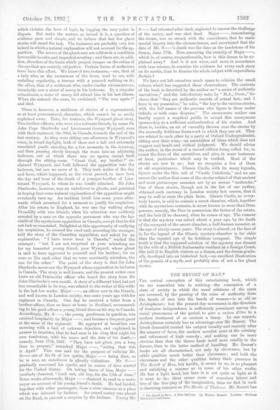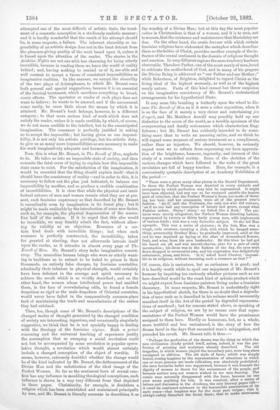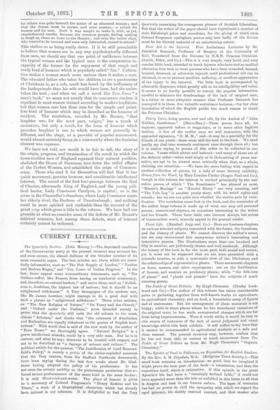THE REVOLT OF MAN.*
Tax central conception of this entertaining book, which we are somewhat late in noticing—the conception of a state of society in which the usual relations of the sexes are reversed, by the passing of the reins of authority from the hands of men into the hands of women—is as old as, Aristophanes ; but the present-day movement in the direction of feminine independence is sufficiently prominent among the, social phenomena of the period, to give a raison Vire to a modern treatment of so ancient a fancy. In one respect,. Aristophanes certainly has an advantage over Mr. Besant. The Greek dramatist treated his subject broadly and coarsely after the manner of farce, the modern novelist aims at the subtlety and refinement of high comedy ; and nothing can be more obvious than that the theme lends itself more readily to the former, than to the latter method of handling. Mr. Besant's books are all characterised, not only by cleverness, but by other qualities much bettor than cleverness ; and both the cleverness and the other qualities betray their presence in, The Revolt of Maw, but hardly, it seems to us, in so pleasant and satisfying a manner as in sonic of his other works, Ile has a light hand, but here it is not quite so light as it i3 wont to be ; there seems more of conscious labour and less of the free play of the imagination, than we find in such a charming romance as The Monks of Thelma.. Mr. Besant ha.s The Revolt of Man, A New Edition, By Walter Busant. London wimpav Blackwood and Sons. attempted one of the most difficult of artistic feats, the treat- Inept of a romantic conception in a studiously realistic manner ; and it is hardly wonderful that the result of his attempt should lbe, in some respects, a failure. The inherent absurdity or im- possibility of an artistic design does not in the least detract from the pleasure-giving quality of the work based upon it, unless it is forced upon the attention of the reader. The stories in the Arabian Night8 are not one whit less charming for being utterly incredible, because in reading them we leave the world of reality behind; and, having nothing to remind us of it, are able and well content to accept a tissue of consistent impossibilities as imaginative realities. In like manner, we accept the absurdity of the two plays of Aristophanes, to which Mr. Besant owes both general and special suggestions, because it is an essential of the farcical treatment, which sacrifices everything to broad, comic effects. The spectator or reader of such plays does not want to believe ; he wants to be amused, and if the amusement come easily, he cares little about the means by which it is attained. Mr. Besant's book belongs, however, to a different category ; to that more serious kind of work which does not satisfy the reader, unless it is made credible, by which, of course, we do not mean credible to the intellect, but to the emancipated imagination. The romancer is perfectly justified in asking us to accept the impossible ; but having given us one impossi- bility, it is not only his artistic privilege, but his artistic duty, to give us as many more impossibilities as are necessary to make his work imaginatively adequate and harmonious.
Now, thie is what Mr. Besant, in The Revolt of Man, neglects to do. He takes us into an impossible state of society, and then commits the fatal error of trying to explain how this impossible state came to exist. For the satisfaction of the imagination, it would be essential that the thing should explain itself—that it should have the consistency of reality—and in order to this, it is necessary to folio* out the plan just indicated, to balance one impossibility by another, and so produce a credible combination of incredibilities. It is clear that while the physical and intel- lectual natures of men and women remain what they are at pre- sent, such feminine supremacy as that described by Mr. Besant is unrealisable even by imagination in its freest play ; but it might be made realisable by the introduction of some new factor, such as, for example, the physical degeneration of the mascu- line half of the nation. If it be urged that this also would be 'incredible, we may frankly admit the fact, without allow- ing its validity as an objection. Romance of a cer- tain kind deals with incredible things ; but when such romance is perfectly constructed, the incredibility, taken for granted at starting, does not afterwards intrude itself upon the reader, as it intrudes in almost every page of The Revolt of Man. Mr. Besant's story lacks imaginative consist- ency. The masculine human beings who were so utterly want- ing in backbone as to submit to be haled to prison in their thousands, on entirely false charges, by feminine constables, admittedly their inferiors in physical strength, would certainly have been deficient in the courage and spirit necessary to achieve the revolt which is so vividly described ; and on the other hand, the women whose intellectual power had enabled them, in the face of overwhelming odds, to found a female despotism as rigid as the male despotism of Oriental countries, would never have failed in the comparatively common-place task of maintaining the trade and manufactures of the nation they had subdued.
Then, too, though some of Mr. Besant's descriptions of the Changed modes of thought generated by the changed condition of society are interesting, ingenious, and occasionally singularly suggestive, we think that he ie not specially happy in dealing with the theology of the feminine regime. Both a priori reasoning and the universal teaching of experience justify the assumption that so sweeping a social revolution could not but be accompanied by some revolution in popular specu- lative thought, a revolution which would almost certainly include a changed .conception of the object of worship. It seems, however, extremely doubtful whether the change would be of the kind indicated by Mr. Besant, the dethronement of the Divine Man and the substitution of the ideal image of the Perfect Woman. So far as the sentiment born of sexual emo- tion has any influence in moulding theological conceptions, such influence is shown in a way very different from that depicted in these pages. Christianity, for example, is doubtless a religion which has been established and maintained principally by men, and Mr. Besant is literally accurate in describing it as the worship of a Divine Man; but at this day the most popular status in Christendom is that of a woman, and it is to men, not to women, that the existence and maintenance that Mariolatry are due. On the other hand, the erotic fervour with which certain feminine religious have elaborated the metaphor which describes them as the brides of Christ, provides another example of the in- fluence of the sexual sentiment in the domain of religious thought and emotion. In very different regions the same tendency has been observable. Theodore Parker, one of the most manly of men,loved to celebrate the motherhood of God, and in many of his prayers the Divine Being is addressed as "our Father and our Mother ;" while Robertson, of Brighton, delighted to regard Christ as the living ideal of the highest womanly, as well as of the highest manly nature. Facts of this kind cannot but throw suspicion on the imaginative consistency of Mr. Besant's ecclesiastical arrangements for his hypothetical State.
It may seem like breaking a butterfly upon the wheel to dis- cuss The Revolt of Man as if it were a sober exposition, when it is on the face of it merely a very clever and entertaining jeu d'esprit, and Mr. Matthew Arnold may possibly hold up our dialectics to the scorn of the world, as a terrible specimen of the overpowering and deadly seriousness which characterises Eng- lishmen; but Mr. Besant has evidently intended to do some- thing more than to write an amusing satire, and we think he will regard some measure of serious treatment as a compliment, rather than an injustice. We should, however, be seriously unjust were we to refrain from expressing our keen apprecia- tion of the brightness, humour, ingenuity, and interest of this study of a remodelled society. Some of the sketches of the various changes which have followed in the wake of the great revolution are full of happy touches. Here, for example, is a conveniently quotable description of an Academy Exhibition of the period :—
"There were a great many altar-pieces in the Sacred Department. In these the Perfect Woman was depicted in every attitude and occupation by which perfection may best be represented. It might have been objected, had any one so far ventured outside the beaten path of criticism, that the Perfect Woman's dress, her mode of dress- ing her hair, and her ornaments, were all of the present year's fashion. 'As if,' said the Professor, the only one who did venture, as if no one had any conception of beauty and grace, except what Fashion orders. Sheep ! sheep ! we follow like a flock.' The pic- tures were mostly allegorical, the Perfect Woman directing Labour, represented by twenty or thirty burly young men, with implements of various kinds; this was a very favourite subject. Or she led Man upwards. This was a series of pictures ; in the first, Man was a rough, rude creature, carrying a club, with which he banged some- thing, presumably Brother Man; he gradually improved, until at the end he was depicted as laying at the altar of womanhood flowers, fruit, and wine, from his own husbandry. By this time he had got his beard out off, and was smooth-shaven, save for a pair of curly moustaches ; his dress was in the fashion of the day, his eyes were down.dropped in reverential awe, and his expression was delightfully submissive, pious, and bdate. 'Is it,' asked Lord Chester, impossi- ble to be religious, without becoming such a creature as that 1""
Of course, this is caricature, but as caricature it is good; and it is hardly worth while to spoil our enjoyment of Mr. Besant's humour by inquiring too curiously whether pictures such as are here described would be the exact kind of artistic product which we might expect from feminine painters living under a feminine theocracy. In 'some respects, Mr. Besant is undoubtedly right in his hypothetical sketch, for there is no doubt that a degrada- tion of man such as is described in his volume would necessarily manifest itself in the Art of the period by degraded representa- tions of manhood ; but for reasons stated above, in speaking of the subject of religion, we are by no means sure that repre- sentations of the Perfect Woman would have the prominence assigned to them here. Hardly so humorous, but, as a whole, more truthful and less caricatured, is the story of how the drama fared in the days that succeeded man's subjugation, and preceded his revolt. Mr. Besant tells it thus :—
"Perhaps the perfection of the drama was the thing on which the new civilisation chiefly prided itself, unless, indeed, it was the per- fection of painting and sculpture already described. The old tragedies, in which women played the secondary part, were long since consigned to oblivion. The old style of farce, which was simply brutal, raising laughter by the representation of situations in which one or more persons are made ridiculous, was absolutely prohibited ; the once favourite ballet was suppressed, because it was beneath the dignity of woman to dance for the amusement of the people, and because neither men.nor women wished to see men dancing. The comic man naturally disappeared with the farce, because na one ever wrote anything for him. It was resolved, after a series of letters and discussion in the Academy, the only literary paper left– it owed its continued existence to the honourable associations of its early years—that laughter was for the most part vulgar ; that it always rudely disturbed the facial lines ; that to make merriment
for others was quite beneath the notice of an educated woman ; and that the drama must be severe, and even austere,—a school for women and for men. Such it was sought to make it, with, as yet, unsatisfactory results, because the common people, finding nothing to laugh at, came no more to the theatre ; and even the better class, who wanted to be amused and were only instructed, ceased to attend."
This strikes us as being really clever. If it be still permissible to believe that women are in any way psychologically different fvom 'nen, we should say that one point of unlikeness between the typical woman and the typical man is the comparative in- capacity of the former for the enjoyment of that rough and ready kind of humour which is popularly called" fun." Cultiva- tion makes a woman much more serious than it makes a man. The educated father who takes his children to see a pantomime at Christmas is, as a rule, much less bored by the buffoonery of the harlequinade than his wife would have been, had she under- taken the task ; and when we call a novel like Tom Tones "a
man's book," we mean not merely that its coarseness renders it repellent to most women trained according to modern traditions, but that women care less than men for the simple and primi-
tive kind of humour which may be described as the humour of incident. The resolution, recorded by Mr. Besant, "that laughter was, for the most part, vulgar," has a touch of caricature, but only a touch, foi the form of humour which provokes laughter is one to which women are generally in-
different, and the stage, as a provider of popular amusement, would almost certainly decay, in a community where the feminine element was supreme.
We have not told, nor would it be fair to tell, the story of the origin, progress, and termination of the revolt by which the down-trodden men of England regained their natural position, abolished the House of Peeresses, tore down the veiled effigies of the Perfect Woman, and established the reign of Common- sense. Those who read it for themselves will find that it has
,quick movement, genuine humour, and considerable intellectual interest. The record of the first love-passage between the Earl of Chester, afterwards King of England, and the young poli- tical leader, Lady Constance Carrlyon, is capital ; so is the scene in the Chancellor's chambers, where Lady Constance meets 'her elderly rival, the Duchess of Dunstanburgh ; and nothing teal be more spirited and realisable than the account of the great coup which gives a title to the volume. We have had our grumble at what we consider some of the defects of Mr. Besant's satirical romance, but among these defects, want of interest certainly cannot be reckoned.




































 Previous page
Previous page